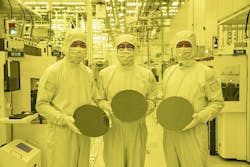Samsung May Build 10 Semiconductor Plants in Texas
IndustryWeek's curated collection of semiconductor news
Samsung is considering building 10 semiconductor plants in and around Austin, Texas, dramatically escalating its plans for microchips as supplies of the critical products remain exceedingly tight worldwide.
Texas tax officials on Wednesday released 12 applications that Samsung made for tax breaks at the Taylor and Manor school districts. Manor serves Austin’s east-side suburbs while Taylor is about 30 miles northeast of the city. The abatement applications don’t detail how much Samsung would spend, other than listing an $80 million minimum (Texas school districts set minimum limits for investments that qualify for tax abatements, so $80 million is a standard minimum figure).
“This project is highly competitive, and the company is exploring national and global sites, plus sites in South Korea where Samsung Austin Semiconductor’s parent company is headquartered,” Samsung said in the documents. “Due to the higher tax cost of operating in Texas, the appraised value limitation is a determining factor. Without the appraised value limitation award, the company would likely not locate the project in Texas.”
Texas does not have income taxes, but its property taxes are among the highest in the nation, according to the Tax Foundation.
Last year, Samsung announced plans for a $17 billion semiconductor plant in Austin (Fab 1), and the new filings list options for Fab 2 through Fab 10. Taylor’s school district received abatement applications for all nine new fabs. Manor received applications for Fab 3 and Fab 4, so at least two Texas communities could be competing against each other for those two projects.
Texas Gov. Greg Abbott praised the potential expansion of Samsung’s investment.
“Close partnerships with companies like Samsung — who recognize the boundless possibilities Texas has to offer — are bringing greater opportunities to Texans, and this potential investment will bring billions of additional capital to continue growing our world-class business climate and diverse, highly-skilled workforce,” Abbott said.
The current semiconductor shortage was building for years but kicked into high gear in 2020 as consumers locked down in their homes ordered record numbers of new computers, tablets and phones. Automakers and other businesses that rely on microchips have been left shorthanded with many car plants filled with semi-finished vehicles, waiting only for their electronic brains to complete them.
In addition to Samsung, Intel is expanding capacity in Arizona and plans to build a $20 billion fab near Columbus, Ohio. Taiwan’s TSMC is in the process of building $35 billion in fabs in Phoenix, Arizona.
Chip makers have been critical of lawmakers recently as legislation in Washington that would provide up to $52 billion in support for microchip production appeared stalled. The popular bill had been inserted into larger pieces of legislation under the hopes that same lawmakers would pass bigger spending bills to get the wanted semiconductor investments.
That logjam may have cleared this week as the U.S. Senate moved forward on a bill that only includes the semiconductor legislation. Senate leaders hope to pass that bill within the next few weeks.
About the Author
Robert Schoenberger
Editor-in-Chief
LinkedIn: linkedin.com/in/robert-schoenberger-4326b810
Bio: Robert Schoenberger has been writing about manufacturing technology in one form or another since the late 1990s. He began his career in newspapers in South Texas and has worked for The Clarion-Ledger in Jackson, Mississippi; The Courier-Journal in Louisville, Kentucky; and The Plain Dealer in Cleveland where he spent more than six years as the automotive reporter. In 2014, he launched Today's Motor Vehicles (now EV Manufacturing & Design), a magazine focusing on design and manufacturing topics within the automotive and commercial truck worlds. He joined IndustryWeek in late 2021.


